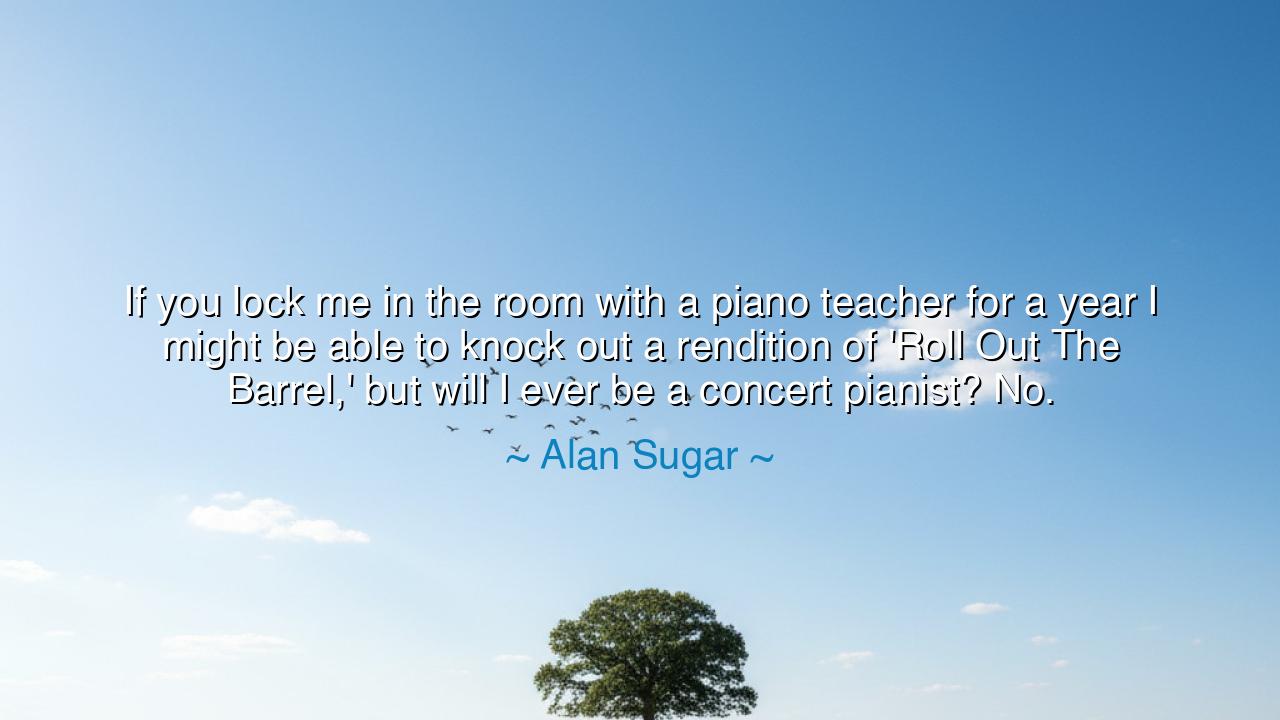
If you lock me in the room with a piano teacher for a year I
If you lock me in the room with a piano teacher for a year I might be able to knock out a rendition of 'Roll Out The Barrel,' but will I ever be a concert pianist? No.






When Alan Sugar said, “If you lock me in the room with a piano teacher for a year I might be able to knock out a rendition of Roll Out The Barrel, but will I ever be a concert pianist? No,” he gave voice to a truth that has echoed across the centuries: not all talents are equal in every soul. His words, spoken with humor, remind us that training alone cannot make a master. Instruction and discipline may raise a person to competence, but the fire of genius—the union of passion, natural gift, and relentless devotion—cannot be manufactured by force.
The origin of this thought lies in the ancient recognition of differing gifts among men. The Greeks spoke of the Muses, each presiding over a different art, suggesting that inspiration was bestowed differently upon every soul. Some were born for music, others for poetry, others for statecraft or war. To lock a man in a room and compel him to practice may give him skill enough to entertain, but not the divine spark to stand before kings and stir hearts to tears with the piano’s voice. Sugar, in his practical way, reminds us that the gulf between learning and mastery is vast, and that not all may cross it.
History offers us countless mirrors of this truth. Consider the boy Mozart, who at an age when others struggle with simple scales, was already composing works of sublime beauty. His talent was not the product of a single teacher’s instruction, but of a flame burning within him. Thousands of others may have studied with equal discipline, yet only a few reached the height of greatness. In this we see Sugar’s wisdom: that training can produce competence, but genius springs from nature and passion as well as effort.
The ancients knew this as well. Aristotle spoke of “natural slaves” and “natural poets,” pointing out that each person has inclinations and abilities built into their being. To force a man to a task outside his nature is to create drudgery, not excellence. Likewise, Marcus Aurelius counseled men to know their role within the harmony of the whole, to embrace their natural gifts rather than chase what was not theirs. Alan Sugar’s quip echoes these ancient voices: no amount of confinement and instruction will turn every man into a master pianist, for mastery is not given to all.
The meaning of the quote, then, is both sobering and liberating. Sobering, because it humbles us: we cannot be everything, nor masters of all. Liberating, because it frees us: we need not measure ourselves by standards that do not suit our gifts. Sugar’s story is not about surrender, but about wisdom—knowing where one’s true talents lie, and refusing to waste life chasing excellence in a field that does not call the heart.
The lesson for us is this: know thyself. Strive to discover where your strengths, passions, and natural inclinations align. Pursue mastery where your soul is most alive, and be content with competence where it is not. A life spent trying to force greatness in the wrong arena will yield only frustration, but a life spent cultivating one’s natural gifts will bear fruit both for oneself and for the world.
Practically, we must live this truth by reflecting on where effort feels fruitful and where it feels barren. Ask yourself: does this pursuit awaken joy, or merely grind me down? Seek counsel from those who see your talents clearly. And once you discover your field, give yourself wholly to it—for while training cannot make a genius of every man, it can elevate a gift into greatness.
Thus Alan Sugar’s humorous words become a timeless teaching: not every soul is born a concert pianist, but every soul is born with its own music to play. Find that music, nurture it, and let it sound. Do not waste your days locked in the wrong room. Instead, step into the calling that is yours, and there, you may yet become extraordinary.






AAdministratorAdministrator
Welcome, honored guests. Please leave a comment, we will respond soon